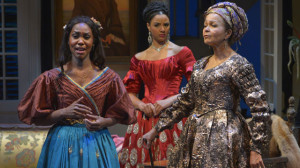It’s always a treat when West Oakland native Marcus Gardley comes back home from New York with one of his plays, whether it’s a densely poetic and mythic fantasia such as …and Jesus Moonwalks the Mississippi, which the Cutting Ball Theater unveiled in 2010, or an interview-based historical portrait of a local community such as Shotgun Players’ Love Is a Dream House in Lorin in 2006 and This World in a Woman’s Hands in 2009. But with The House that will not Stand, his commissioned world premiere at Berkeley Repertory Theatre, the 36-year-old playwright seems to have upped his game.
Developed through the Ground Floor, Berkeley Rep’s recently launched new works program, Gardley’s House uses the 1936 Federico García Lorca classic The House of Bernarda Alba as a jumping-off point, but there’s much more to it than adaptation. Gardley masterfully weaves together the basic plot of García Lorca’s play with wry humor, lyrical poetry and elements of magic and ritual while grounding the drama very specifically in a particular place in time. Instead of a Spanish village, Gardley’s House is planted in New Orleans in 1836, and this setting proves to be absolutely central to the story.

Aside from being 100 years before Bernarda Alba‘s completion and García Lorca’s death, 1836 was a time of great change for New Orleans as the former French colony adapted to becoming part of the United States, whose laws were not as friendly to free people of color as those to which they were accustomed. In particular, the long-honored status of the placée, or live-in mistress “placed” with a white man (essentially sold to him by her mother), was neither understood or respected by the new regime.
After living for decades in such an arrangement with the wealthy white man Lazare, Beartrice Albans leaps into action as soon as he dies suddenly (and maybe suspiciously) at age 72. She immediately puts the house into full-scale mourning, pointedly forbidding her three teenage daughters from attending a masked ball where placées find their places.
Names are important in Marcus Gardley plays, and Beartrice’s is in part an obvious reference to the source material. But she’s also a mama bear fiercely protecting her young. Lizan Mitchell is stunning and formidable as the matriarch, both immaculately refined and earthily no-nonsense. When she makes cutting remarks, which is often, she delivers them like an expertly placed punch in the gut. Her encounters with her bitter rival Madame La Veuve (an elegantly two-faced Petronia Paley) are always a good opportunity for hilariously withering telling-off sessions. Paley does double duty in two very different roles, also playing the mad sister that Beartrice has hidden away, who goes from beatific reminiscences to frenzied doomsaying on a dime.

Harriet D. Foy is magnetic as Makeda, the household slave (yes, they have one) who looks after the family with love and good humor, but makes no secret of the fact that she’ll leave in a heartbeat the minute she’s given her freedom. Often sharply witty in her down-to-earth truth-telling, she’s a powerful voice for embracing one’s blackness and African heritage in an environment where lightness of skin is equated with not just privilege but even possibility. Makeda also practices voodoo as naturally as she cooks or gossips, in striking contrast to the cartoonishly stereotypical voodoo housemaid in Berkeley Rep’s recent staging of Christopher Durang’s Vanya and Sonia and Masha and Spike.





